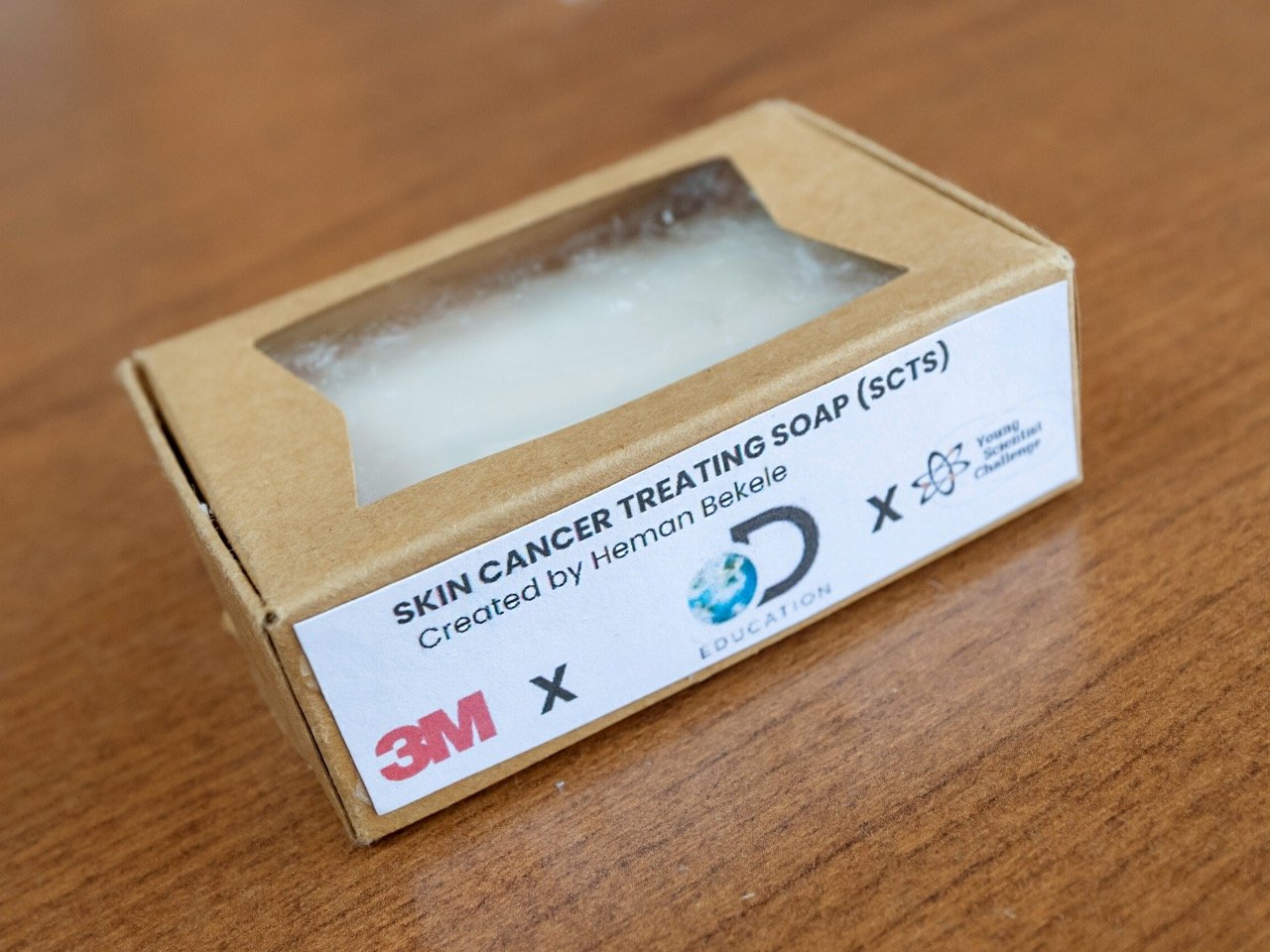Technology
Young Innovator Develops Soap That Could Combat Skin Cancer

A remarkable innovation has emerged from a 14-year-old inventor in Virginia, who has created a soap that may treat and prevent skin cancer. Heman Bekele’s invention, known as Skin Cancer Treating Soap (SCTS), combines fundamental chemistry with advanced drug delivery systems, presenting a potential breakthrough in skin cancer treatment. This affordable soap, which costs less than $9 per bar, could drastically change the landscape of skin cancer care.
Bekele’s journey began with childhood experiences in Ethiopia, where he witnessed individuals working long hours under the sun without proper protection. After relocating to the United States, he connected these observations to the realities of skin cancer risks and treatment disparities. The standard treatment, imiquimod cream, can cost upwards of $40,000, making it unattainable for many around the world. Inspired by this, Bekele sought to create a cost-effective solution that could deliver the same active ingredient.
The technical brilliance of Bekele’s soap lies in its incorporation of lipid nanoparticles, which encapsulate imiquimod—a compound approved by the FDA that activates immune cells to combat cancer. When users wash with SCTS, the lipid nanoparticles bond to the skin at a molecular level, remaining after rinsing to ensure prolonged contact with the active ingredient. This innovative approach addresses a common challenge in topical medications, enhancing their effectiveness while significantly reducing costs.
Recognition and Ongoing Research
Heman Bekele’s work has garnered significant attention in the scientific community. His invention earned him the prestigious 3M Young Scientist Challenge award, which includes a $25,000 prize, and he was named TIME magazine’s 2024 Kid of the Year. Recently, he was also awarded the Gloria Barron Prize for Young Heroes, adding another $10,000 to support his ongoing research.
Currently, Bekele is collaborating with molecular biologist Vito Rebecca at the Johns Hopkins Bloomberg School of Public Health. Together, they are conducting tests on mice injected with skin cancer cells, and preliminary results are encouraging. Despite these promising findings, Bekele and his team recognize that there is still considerable work ahead. The process of patenting, conducting clinical trials, and obtaining FDA approval can take up to a decade.
Broader Implications for Health Care
The implications of Bekele’s work extend beyond a new treatment option for skin cancer. If successful, this technology could transform drug delivery systems on a global scale, making essential treatments more accessible, particularly in regions with limited healthcare infrastructure. This innovative approach could also be adapted for other skin conditions and preventative applications, broadening its potential impact.
Heman Bekele’s story illustrates how creativity and determination can lead to significant advancements in healthcare. As a young innovator balancing high school responsibilities with groundbreaking research, he embodies the spirit of innovation that can inspire future generations. His work not only addresses a critical health issue but also highlights the potential for young minds to drive meaningful change in the world.
-

 Education3 months ago
Education3 months agoBrandon University’s Failed $5 Million Project Sparks Oversight Review
-

 Science4 months ago
Science4 months agoMicrosoft Confirms U.S. Law Overrules Canadian Data Sovereignty
-

 Lifestyle3 months ago
Lifestyle3 months agoWinnipeg Celebrates Culinary Creativity During Le Burger Week 2025
-

 Health4 months ago
Health4 months agoMontreal’s Groupe Marcelle Leads Canadian Cosmetic Industry Growth
-

 Technology3 months ago
Technology3 months agoDragon Ball: Sparking! Zero Launching on Switch and Switch 2 This November
-

 Science4 months ago
Science4 months agoTech Innovator Amandipp Singh Transforms Hiring for Disabled
-

 Education3 months ago
Education3 months agoRed River College Launches New Programs to Address Industry Needs
-

 Technology4 months ago
Technology4 months agoGoogle Pixel 10 Pro Fold Specs Unveiled Ahead of Launch
-

 Business3 months ago
Business3 months agoRocket Lab Reports Strong Q2 2025 Revenue Growth and Future Plans
-

 Technology2 months ago
Technology2 months agoDiscord Faces Serious Security Breach Affecting Millions
-

 Education3 months ago
Education3 months agoAlberta Teachers’ Strike: Potential Impacts on Students and Families
-

 Science3 months ago
Science3 months agoChina’s Wukong Spacesuit Sets New Standard for AI in Space
-

 Education3 months ago
Education3 months agoNew SĆIȺNEW̱ SṮEȽIṮḴEȽ Elementary Opens in Langford for 2025/2026 Year
-

 Technology4 months ago
Technology4 months agoWorld of Warcraft Players Buzz Over 19-Quest Bee Challenge
-

 Business4 months ago
Business4 months agoNew Estimates Reveal ChatGPT-5 Energy Use Could Soar
-

 Business3 months ago
Business3 months agoDawson City Residents Rally Around Buy Canadian Movement
-

 Technology2 months ago
Technology2 months agoHuawei MatePad 12X Redefines Tablet Experience for Professionals
-

 Business3 months ago
Business3 months agoBNA Brewing to Open New Bowling Alley in Downtown Penticton
-

 Technology4 months ago
Technology4 months agoFuture Entertainment Launches DDoD with Gameplay Trailer Showcase
-

 Technology4 months ago
Technology4 months agoGlobal Launch of Ragnarok M: Classic Set for September 3, 2025
-

 Technology4 months ago
Technology4 months agoInnovative 140W GaN Travel Adapter Combines Power and Convenience
-

 Science4 months ago
Science4 months agoXi Labs Innovates with New AI Operating System Set for 2025 Launch
-

 Top Stories2 months ago
Top Stories2 months agoBlue Jays Shift José Berríos to Bullpen Ahead of Playoffs
-

 Technology4 months ago
Technology4 months agoNew IDR01 Smart Ring Offers Advanced Sports Tracking for $169










